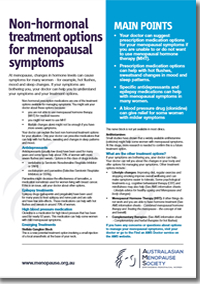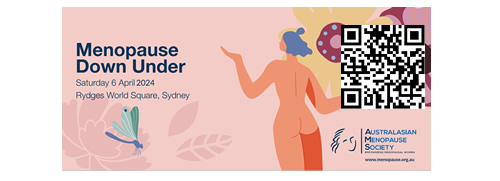
MAIN POINTS
- Your doctor can suggest prescription medication options for your menopausal symptoms if you are unable to or do not want to use menopausal hormone therapy (MHT).
- Prescription medication options can help with hot flushes, sweats and changes in mood and sleep patterns.
- Specific antidepressants and epilepsy medications can help with menopausal symptoms in many women.
- A blood pressure drug (clonidine) can give relief for some women with milder symptoms
![]() Non-hormonal treatment options for menopausal symptoms59.3 KB
Non-hormonal treatment options for menopausal symptoms59.3 KB
At menopause, changes in hormone levels can cause symptoms for many women – for example, hot flushes, mood and sleep changes. If your symptoms are bothering you, your doctor can help you to understand your symptoms and your treatment options.
Non-hormonal prescription medications are one of the treatment options available for managing symptoms. You might ask your doctor about these options because: you are not able to use menopausal hormone therapy (MHT) for medical reasons, you might not want to use MHT, lifestyle changes alone might not be enough if you have more severe symptoms. Your doctor can explain the best non-hormonal treatment options for your situation. Only your doctor can prescribe medications that can help with hot flushes, sweating and changes in sleep patterns and mood.
Antidepressants
Antidepressants (usually low dose) have been used for many years and some types help about 70% of women with more severe flushes and sweats. Options in this class of drugs include:
- venlafaxine (a Serotonin-Noradrenaline Reuptake Inhibitor or SNRI)
- escitalopram and paroxetine (Selective Serotonin Reuptake Inhibitors or SSRIs).
Paroxetine might decrease the effectiveness of tamoxifen, a medication sometimes used for women living with breast cancer. If this is an issue, ask your doctor about other options.
Epilepsy treatments
Epilepsy drugs (gabapentin and pregabalin) have been used for many years to treat epilepsy and nerve pain and are safe and have few side effects. These medications can help with hot flushes and sweats in around 70% of women.
High blood pressure medication
Clonidine is a medication for high blood pressure that has been used for nearly 50 years. This medication can help some women with mild menopausal symptoms.
Emerging Treatments
Stellate Ganglion Block
This is a new potential treatment option involving a small injection of a local anaesthetic at the base of your neck.
This nerve block is not yet available in most clinics.
Antihistamines
Small studies have shown that a widely available antihistamine (cetirizine) might help some women with menopausal symptoms. At this stage, more research is needed to confirm this is a future treatment option.
What are the other treatment options?
If your symptoms are bothering you, your doctor can help. Your doctor can tell you about the changes in your body and offer options for managing your symptoms. Other treatment options include:
- Lifestyle changes: Improving diet, regular exercise and stopping smoking improve overall wellbeing and can make symptoms easier to tolerate. Some psychological treatments e.g. cognitive behavioural therapy (CBT) and mindfulness may also help (See AMS information sheet - Lifestyle and behavioural modifications for menopausal symptoms)
- Menopausal Hormone Therapy (HRT): if other things do not work and you are able to have hormone treatment (See AMS information sheets – Combined menopausal hormone therapy and Risks and Benefits of MHT/HRT)
- Complementary therapies: (See AMS information sheet – Complementary and herbal therapies for hot flushes)
If you have any concerns or questions about options to manage your menopausal symptoms, visit your doctor or go to the Find an AMS Doctor service on the AMS website.

NOTE: Medical and scientific information provided and endorsed by the Australasian Menopause Society might not be relevant to an individual’s personal circumstances and should always be discussed with their own healthcare provider. This Information Sheet may contain copyright or otherwise protected material. Reproduction of this Information Sheet by Australasian Menopause Society Members, other health professionals and their patients for clinical practice is permissible. Any other use of this information (hardcopy and electronic versions) must be agreed to and approved by the Australasian Menopause Society.
Content updated April 2017






